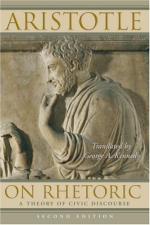
|
| Name: _________________________ | Period: ___________________ |
This quiz consists of 5 multiple choice and 5 short answer questions through Book III, Chapters 1-9.
Multiple Choice Questions
1. Based on Aristotle's explanation of the wealthy, how did wealthy people view the opinions of others about money?
(a) They thought that most people were incapable of understanding their view of money.
(b) They thought that everyone shared their view of money.
(c) They thought that everyone disagreed with their view of money.
(d) They thought that most people understood their view of money, but did not understand the reasons for it.
2. How did Aristotle explain the binding extent of contracts?
(a) Only between the courts and an individual.
(b) Only between two individuals or the courts and an individual.
(c) Only between two individuals.
(d) They were not binding.
3. According to Aristotle, how was the structure of text conveyed in the periodic prose?
(a) By the flow of words and the tone of the orator's voice.
(b) By the length of each sentence and the tone of the orator's voice.
(c) By the flow of words, the length of each sentence, and the tone of the orator's voice.
(d) By the flow of words and the length of each sentence.
4. As explained in Book III, Chapter 3, in what way did writers misuse the epithet?
(a) By forgetting how to apply it.
(b) By applying it to insignificant subjects.
(c) By forgetting to apply it.
(d) By applying it to inappropriate subjects.
5. How did Aristotle define that which is unpleasant?
(a) The opposite to any of the things that have been determined to be pleasant.
(b) The opposite of pleasure.
(c) The opposite to certain things that have been determined to be pleasant.
(d) The opposite of good.
Short Answer Questions
1. What did Aristotle think was the intent of all voluntary actions?
2. How many periods of a lifetime did Aristotle discuss in Book II, Chapter 12?
3. Which characteristic did Aristotle think separated powerful people and wealthy people in general?
4. As explained in Book I, Chapter 14, which things should be considered when deciding the unjustness of an action?
5. What shape was described in the example Aristotle provided for the use of description in an impressive speech?
|
This section contains 371 words (approx. 2 pages at 300 words per page) |

|




